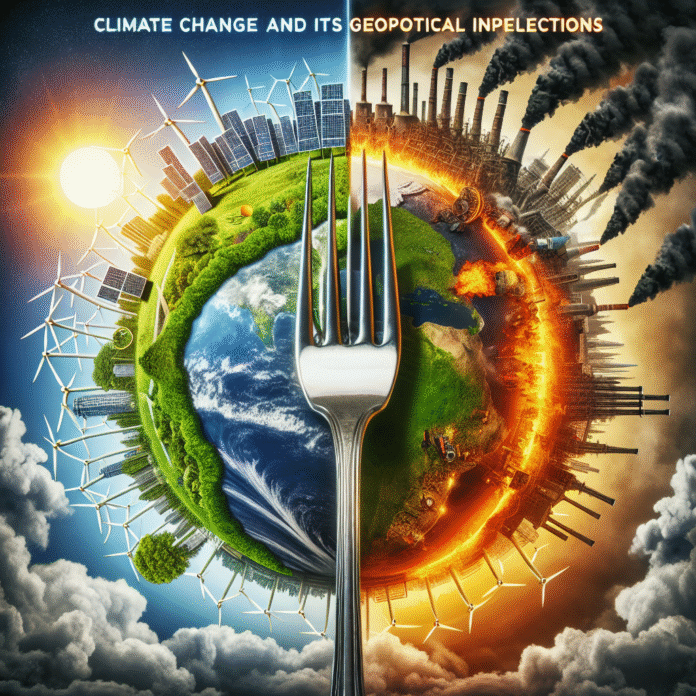Climate change is no longer just an environmental issue; it’s a multifaceted crisis that poses significant geopolitical challenges across the globe. Rising temperatures, extreme weather events, and the resulting humanitarian crises are reshaping global politics, leading to competition for resources, migration crises, and shifts in power dynamics. As nations confront the reality of a warming planet, understanding the nexus between climate change and geopolitics is paramount.
The Interconnected Nature of Climate Change
Climate change affects natural resources, food security, and water availability, creating tension among nations. Some regions are experiencing increased droughts, while others face devastating flooding. These disparities can lead to conflict over diminishing resources. For instance, the Nile River—often a source of contention among Egypt, Sudan, and Ethiopia—illustrates how water scarcity can be exacerbated by climate change. As these nations compete for limited resources, diplomatic tensions could escalate, leading to conflict.
Resource Scarcity and Competition
One of the most pressing geopolitical implications of climate change is the struggle for resources. As the climate warms, regions that were once fertile may become arid, while others may face the opposite scenario. The melting of polar ice caps is also opening up new shipping routes and access to previously untapped resources in the Arctic. This has intensified competition among countries like Russia, Canada, and the United States to claim territory and exploit resources. The Arctic could become a geopolitical hotspot as nations seek to secure their economic and strategic interests in this rapidly changing environment.
Migration Crises
As climate change exacerbates food and water shortages, millions may be forced to flee their homes, leading to mass migration. The United Nations estimates that as many as 1 billion people could be displaced by climate change by 2050. This movement of people could create strains on host countries, disrupt social cohesion, and lead to xenophobia and conflict. For example, the Syrian civil war has been linked, in part, to a severe drought that displaced rural farmers, ultimately contributing to widespread unrest. Countries will need to navigate these migration challenges delicately, balancing humanitarian responsibilities with national security concerns.
Humanitarian Crises and Global Stability
Natural disasters intensified by climate change often outpace the capacity of governments to respond effectively, leading to humanitarian crises. As seen in recent hurricanes, wildfires, and floods, the strain on emergency services and infrastructure can undermine governance, especially in developing nations. The international community faces challenges in providing aid and rebuilding efforts, while also addressing the root causes of vulnerability, such as poverty and inequality. This cycle of disaster and instability can create fertile ground for extremist movements and further conflict.
Shifts in Global Power Dynamics
Climate change is also reshaping global power dynamics. Nations that proactively adapt to and mitigate climate risks may gain a competitive edge. Countries like Denmark and Sweden are positioning themselves as leaders in renewable energy and sustainability, potentially influencing global policies and economic opportunities. Conversely, nations that fail to address climate change could find themselves marginalized on the world stage.
As global coordination becomes increasingly vital, organizations like the United Nations play a crucial role in promoting cooperation and resilience. However, geopolitical rivalries can hinder collective action. The challenge for global governance will be to unite countries around shared interests in climate resilience while acknowledging national sovereignty and self-interest.
The Role of Technology and Innovation
Technological innovation holds the key to addressing many of these challenges. Advances in renewable energy, carbon capture, and sustainable agriculture can help mitigate the effects of climate change. Nations that invest in these technologies may not only enhance their resilience but also gain economic and geopolitical advantages. However, this technological race must be managed ethically and equitably to ensure that benefits are accessible to all nations, avoiding a scenario where the gap between the global north and south widens.
Conclusion
The intertwining of climate change and geopolitics is a stark reminder that the decisions made today will have far-reaching consequences for the future. Global leaders must recognize the urgency of this crisis and work collaboratively to address its multifaceted implications. A proactive approach to sustainability, resource management, and humanitarian assistance can help mitigate the risks of conflict and displacement. As we stand at this geopolitical crossroads, our response to climate change will shape not only our environment but the fabric of international relations for generations to come.
In this world at forks, the choices are clear: we can either exacerbate existing tensions and inequalities, or we can embrace a unified path towards resilience and cooperation. The future of our planet—and the stability of our world—depends on it.






